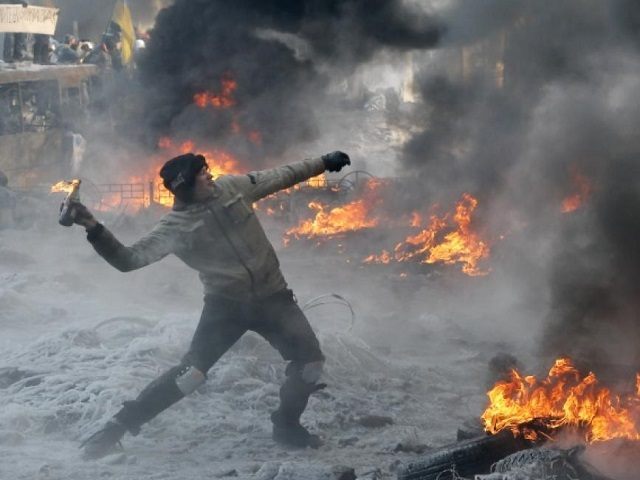 An American archbishop who served as Vatican nuncio to Ukraine until several weeks ago warned that the country is in dire straits and risks becoming “a kind of Somalia in the middle of Europe.”
An American archbishop who served as Vatican nuncio to Ukraine until several weeks ago warned that the country is in dire straits and risks becoming “a kind of Somalia in the middle of Europe.”
Archbishop Thomas Gullickson, who was Papal Nuncio in Kiev from November 2011 until this past September, is especially insistent that the West must intervene with a sort of “Marshall Plan” to help rebuild Ukraine before it is too late.
“Ukraine desperately needs support from abroad, so it doesn’t become a so-called failed state—this risk is unfortunately very great,” the archbishop told Vatican Radio.
“I hope the world, and especially the countries of Western Europe, will overcome their resistance and do the same as was done after World War II with the Marshall Plan. No one waited till all Nazis were behind bars—they began immediately to rebuild Europe,” he said.
Gullickson stressed that just because Ukraine isn’t in the news every day, doesn’t mean it is not going through a critical moment in its history, which could easily go very wrong and could negatively affect others as well.
“There’s a real danger Ukraine will become a kind of Somalia in the middle of Europe—Europe can’t turn its back on the Ukrainians and close its eyes to what’s happening,” said the nuncio, who now works as Vatican ambassador to Switzerland and Liechtenstein.
“Events in Ukraine will have consequences for the rest of the world. You can’t just say goodbye, good luck—keep warm and well-fed. We have to engage,” he said.
The archbishop has not been sparing in his criticism both of the Ukrainian government, which he has called a “criminal oligarchy,” and “Russian aggression” as the joint cause of serious destabilization in the nation.
Gullickson has insisted, however, that Ukrainian woes won’t all disappear with a Russian retreat. “If Russian aggression ended tomorrow, apart from rebuilding the east,” he said, “Ukraine would still have enormous challenges to meet in order to root out corruption and establish a just society.”
Gullickson is not alone in his dismal assessment of the state of affairs in Ukraine. The head of the Ukrainian Catholic church has also stressed the critical nature of the situation, specifically targeting the Vatican to step up and vigorously take Ukraine’s side, instead of dancing around the issues.
“I would have expected a lot more involvement by the Vatican—the time for cautious diplomacy is at an end,” said Archbishop Sviatoslav Shevchuk of Kiev-Halych, the major archbishop of the Ukrainian Catholic Church, who is attending the Vatican synod on the Family this month.
Prior to his appointment in Ukraine, Shevchuk had served in Buenos Aires, where he became friends with Cardinal Jorge Bergoglio, now Pope Francis.
The Holy See has reiterated its support for Ukraine, but apparently Shevchuk would like to see more.
“I have listened attentively to your problems,” the Pope told the Ukrainian bishops last February, “and they are not few.” Significantly, he also told them: “The Holy See has your back, also on the international stage, to articulate your rights, your concerns and the evangelical values that motivate you.”
According to reports, Pope Francis has accepted an invitation from President Poroshenko to travel to Ukraine, but as yet no date has been set.
Shevchuk said that he, too, had personally presented Pope Francis with an invitation to go to the ex-Soviet country, and said that such a visit would “bring peace to that part of Eastern Europe soaked with the blood of so many martyrs for the unity of the Church.”
For now that moment seems a long way off.
“The fact that 70% of Ukrainian army regulars fighting against separatists and Russian soldiers have Russian as their mother-tongue shows the unity of our people and our army,” Shevchuk said. “What we are seeing is a foreign invasion of Ukrainian territory by Russian troops.”
Last week, leaders from Ukraine, Russia, Germany and France agreed to support the withdrawal of tanks and heavy weapons from front-line positions in eastern Ukraine, as a preliminary step toward elections in the Donetsk and Luhansk regions.
Moscow has denied sending troops to Ukraine, but admitted that Russian “volunteers” are fighting alongside the separatists.
Ukrainian Catholic leaders have repeatedly accused Russia of military intervention in the war, in which some 8,000 people have been killed and 17,800 injured since April 2014.































